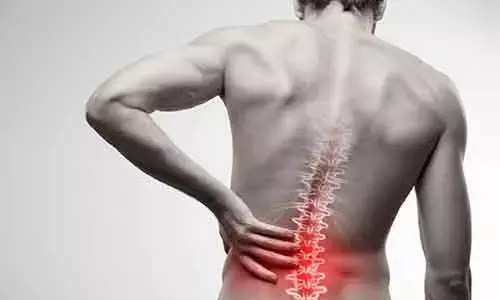- Home
- Medical news & Guidelines
- Anesthesiology
- Cardiology and CTVS
- Critical Care
- Dentistry
- Dermatology
- Diabetes and Endocrinology
- ENT
- Gastroenterology
- Medicine
- Nephrology
- Neurology
- Obstretics-Gynaecology
- Oncology
- Ophthalmology
- Orthopaedics
- Pediatrics-Neonatology
- Psychiatry
- Pulmonology
- Radiology
- Surgery
- Urology
- Laboratory Medicine
- Diet
- Nursing
- Paramedical
- Physiotherapy
- Health news
- Fact Check
- Bone Health Fact Check
- Brain Health Fact Check
- Cancer Related Fact Check
- Child Care Fact Check
- Dental and oral health fact check
- Diabetes and metabolic health fact check
- Diet and Nutrition Fact Check
- Eye and ENT Care Fact Check
- Fitness fact check
- Gut health fact check
- Heart health fact check
- Kidney health fact check
- Medical education fact check
- Men's health fact check
- Respiratory fact check
- Skin and hair care fact check
- Vaccine and Immunization fact check
- Women's health fact check
- AYUSH
- State News
- Andaman and Nicobar Islands
- Andhra Pradesh
- Arunachal Pradesh
- Assam
- Bihar
- Chandigarh
- Chattisgarh
- Dadra and Nagar Haveli
- Daman and Diu
- Delhi
- Goa
- Gujarat
- Haryana
- Himachal Pradesh
- Jammu & Kashmir
- Jharkhand
- Karnataka
- Kerala
- Ladakh
- Lakshadweep
- Madhya Pradesh
- Maharashtra
- Manipur
- Meghalaya
- Mizoram
- Nagaland
- Odisha
- Puducherry
- Punjab
- Rajasthan
- Sikkim
- Tamil Nadu
- Telangana
- Tripura
- Uttar Pradesh
- Uttrakhand
- West Bengal
- Medical Education
- Industry
Antidepressants largely ineffective in musculoskeletal pain, finds BMJ study

Antidepressants are being widely used for chronic back pain and hip and knee osteoarthritis.When first-line pain medications such as paracetamol and ibuprofen fail to improve symptoms, many people are prescribed antidepressants for their pain.Most clinical practice guidelines also recommend antidepressants for for these conditions yet evidence supporting their use is uncertain.
Researchers led by Giovanni Ferreira at the University of Sydney have found in a new Meta analysis that antidepressant drugs are largely ineffective in musculoskeletal pain including back and osteoarthritis pain. The findings, based on moderate certainty evidence, show that for people with back pain the effects were too small to be worthwhile, but for osteoarthritis a small beneficial effect cannot be ruled out.
The review has been published by The BMJ today.
Their findings are based on analysis of published data from 33 randomised controlled trials involving more than 5,000 adults with low back or neck pain, sciatica, or hip or knee osteoarthritis.
These trials tested six classes of antidepressants:
- serotonin-noradrenaline reuptake inhibitors (SNRIs)
- selective serotonin reuptake inhibitors (SSRIs)
- noradrenaline-dopamine reuptake inhibitors (NDRIs)
- tricyclic antidepressants
- tetracyclic antidepressants
The study set a difference of 10 points on a 0-100 scale for pain as the smallest worthwhile difference between groups, which is a common threshold in studies of chronic pain.
Key findings:
- SNRIs had a trivially small effect on back pain, reducing pain by just 5.3 points out of 100 on the pain scale compared with placebo after three months. This amount is unlikely to be considered clinically important by most patients.
- SNRIs had a slighter stronger effect on osteoarthritis pain after three months, with an average difference of 9.7 points on the pain scale compared with placebo. This amount is still small, but close to the 10 point difference needed for antidepressants to be considered worthwhile by some patients.
- Tricyclic antidepressants were ineffective for back pain and related disability
- Tricyclic antidepressants and SNRIs might reduce pain in people with sciatica (pain down the leg associated with back pain), but the evidence was not certain enough to draw any firm conclusions.
- SNRI antidepressants significantly increased the risk of patients experiencing an adverse event; about two-thirds of patients taking this class of antidepressant had at least one adverse event such as nausea.
Dr Ferreira said this information could help clinicians and patients make more informed decisions about whether to treat chronic back pain and osteoarthritis pain with antidepressants.
The trials were designed differently, and were of varying quality, but the researchers were able to allow for this in their analysis. Most of the data came from industry sponsored trials.
As such, the Researchers say that their review updates the evidence for back pain, sciatica, and osteoarthritis, and could help clinicians and their patients decide whether to take antidepressants for chronic pain.
But they conclude: "Large, definitive randomised trials that are free of industry ties are urgently needed to resolve uncertainties about the efficacy of antidepressants for sciatica and osteoarthritis highlighted by this review."
In a linked editorial, researchers at the University of Warwick call for clearer guidance to inform a consistent approach to use of antidepressants for people with painful disorders.
They acknowledge that some patients might choose to try antidepressants for a small chance of a worthwhile reduction in pain after three months.
Overall, however, they argue that drug treatments "are largely ineffective for back pain and osteoarthritis and have the potential for serious harm. We need to work harder to help people with these disorders to live better with their pain without recourse to the prescription pad."
Dr Kamal Kant Kohli-MBBS, DTCD- a chest specialist with more than 30 years of practice and a flair for writing clinical articles, Dr Kamal Kant Kohli joined Medical Dialogues as a Chief Editor of Medical News. Besides writing articles, as an editor, he proofreads and verifies all the medical content published on Medical Dialogues including those coming from journals, studies,medical conferences,guidelines etc. Email: drkohli@medicaldialogues.in. Contact no. 011-43720751


